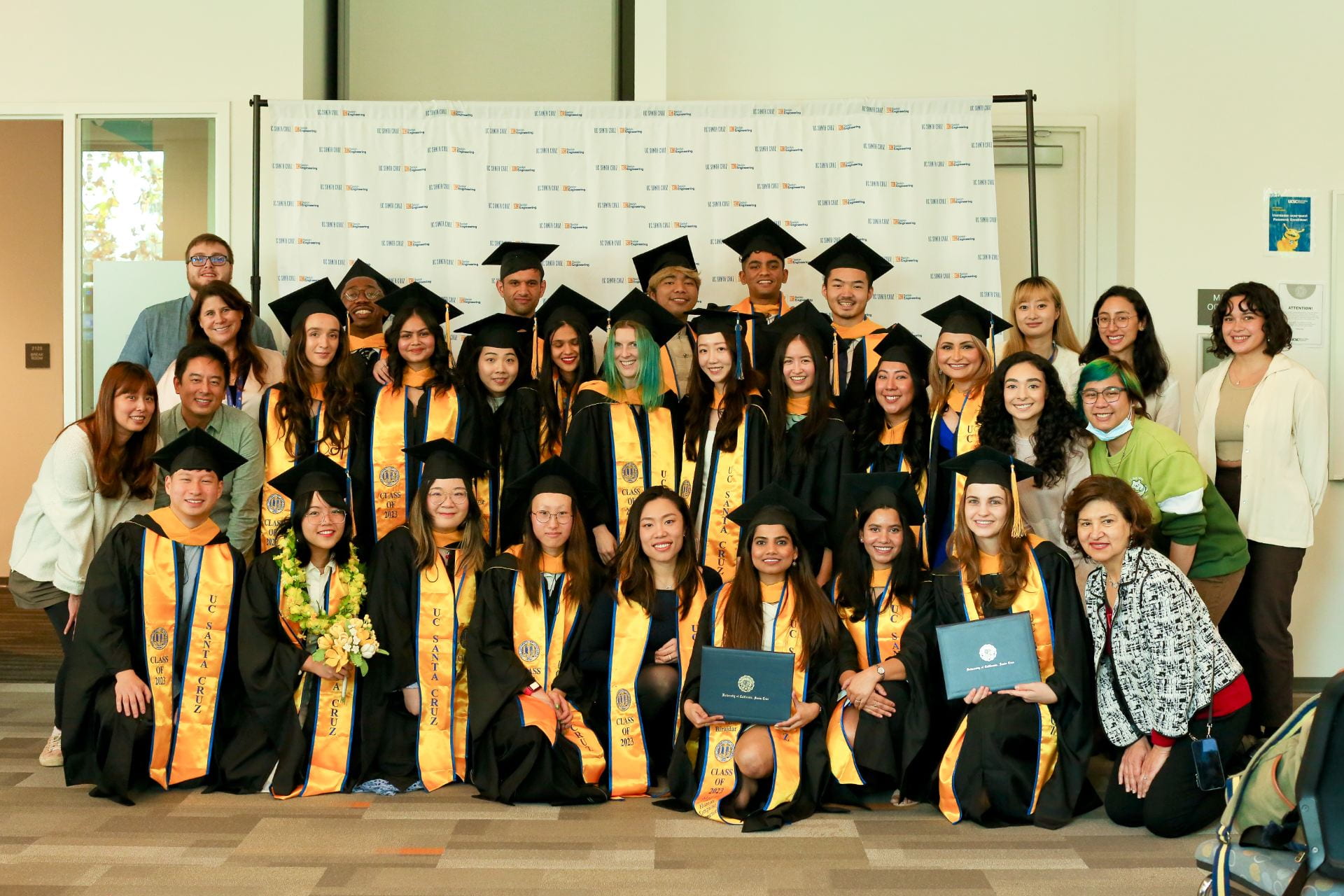
The HCI MS curriculum
Human Computer Interaction is the “human-side of computing.” HCI practitioners are not simply interested in building new technologies, they want build technologies that fit people’s needs and desires, understand what challenges users currently have with technologies, and design a future with technology that is more inclusive and equitable. HCI is interdisciplinary and draws from fields that seek to understand people and technology, including psychology, social sciences, humanities, and computer science.
UCSC’s Human Computer Interaction MS program is a four-quarter (15-month) STEM program in the Computational Media Department with an optional summer internship. The program aims to train students in core skill sets for human computer interaction professionals, including HCI foundational readings and theories, design methodologies, prototyping and technical build skills, eliciting and integrating subject matter knowledge, designing and conducting efficacy measurements, effective teamwork, and career planning—all within the context of user experience and interaction. UCSC’s HCI program is unique in that it is collocated at the Silicon Valley campus alongside the Games and Playable Media MS program, offering opportunities to explore the intersection of HCI and games research.
The curriculum is designed to accommodate students with a range of backgrounds and expertise, including social sciences, technical skills, and/or subject matter knowledge. Students with varying knowledge will be intentionally mixed together in coursework, in order to maximize peer learning and collaboration across strengths. This includes the completion of a two-quarter long capstone sequence, in which students work with industry and community partners to conduct user research and design.
The program’s curriculum is designed so that all students develop a baseline understanding of the necessary areas: design, methodologies, building, eliciting and integrating subject matter knowledge, designing and conducting efficacy measurements, effective teamwork, and career planning – all within the context of user experience and interaction. We not only consider user experience (UX) in terms of “functionality, efficiency, optimality, task focus” but also UX that support collaboration, reflection, emotions, and critique.
A key feature of our curriculum are its touch points with industry and non-profits, through seminars featuring speakers and our capstone projects which are often paired with industry/non-profit sponsors.

Course requirements
Note: See the HCI Graduate Student handbook for official requirements.
The minimum unit requirement for the MS degree in Human Computer Interaction is 53 units. Unit requirement breakdown:
- Core Courses (28 credits)
- 2 Elective Courses (10 credits)
- Capstone Project (15 credits)
Core courses
All students are required to enroll and pass (letter grade “B-” or better or an “S” grade) the following six courses:
- HCI 200: Introduction to HCI (5 credits)
- HCI 201: Introduction to Design (5 credits)
- HCI 202a: Introduction to Build, Bootcamp (5 credits), or
HCI 202b: Introduction to Build, Advanced (5 credits) - HCI 220: Ethics and Activism in Tech and Design (5 credits)
- HCI 290: HCI Seminar (2 credits) taken four times for a total of 8 credits
Elective courses
All students are required to enroll and pass (letter grade “B-” or better or an “S” grade) in a minimum of two elective course. As HCI is housed within the Computational Media Department, including the Computational Media MS/Ph.D., and Games and Playable Media MS, HCI students will be able to choose from a wide variety of electives related to human computer interaction. A full list of pre-approved electives is available in HCI Graduate Student handbook.
Note that an HCI core class cannot count for an elective (e.g., if you decide to take both HCI 202a and HCI 202b, neither can count for an elective). Electives are meant to expose you to knowledge outside core classes.
Capstone project courses
All students are required to enroll and pass (letter grade “B-” or better) the Capstone Project series:
- HCI 271: Capstone I (5 credits)
- HCI 272: Capstone II (10 credits)
In the capstone sequence (HCI 271 and HCI 272) students work in teams with industry sponsors. The capstone is the culmination of the program, where student teams will cover end-to-end design process of a product lifecycle using the skills they have developed throughout the MS degree. HCI 271 involves discovery, exploration, and research of the design space. HCI 272 involves prototyping, evaluation, and iteration. Both courses require students to develop and hone inclusive design practices, documentation and communication of design decisions to multiple stakeholders, and team professionalism.
During HCI 271 Capstone I, students form project teams with capstone sponsors (e.g., industry sponsors or faculty), develop a UX strategy, design and execute user research, analyze user data, and deliver polished user research deliverables to stakeholders. HCI 272 Capstone II is a double-weighted course in which the same student teams produce a polished, high quality capstone project (e.g., high fidelity prototype, including design components) through extensive building of prototypes, user evaluations, and iterations of designs. The quarter culminates in a showcase where students communicate their work to stakeholders in multiple mediums.
Capstone sponsors are chosen at the discretion of the HCI Vice Chair, HCI Executive Director, and the HCI 271/272 instructors. Students may propose a sponsor which must be approved by instructors, by a deadline determined by instructors. Capstone student teams will be ultimately decided by instructors and will remain constant throughout the capstone sequence. In the case sponsors no longer can participate in either capstone class, instructors will reassign student teams to other sponsors as appropriate.
In the summer between HCI 271 and HCI 272 there may be opportunities to work independently with capstone sponsors on non-capstone related projects – the student is responsible for any agreement to do work with sponsors over the summer; the HCI MS program has no oversight nor role with such arrangements. Capstone-related work can not be carried out during the summer without prior approval from capstone instructors.